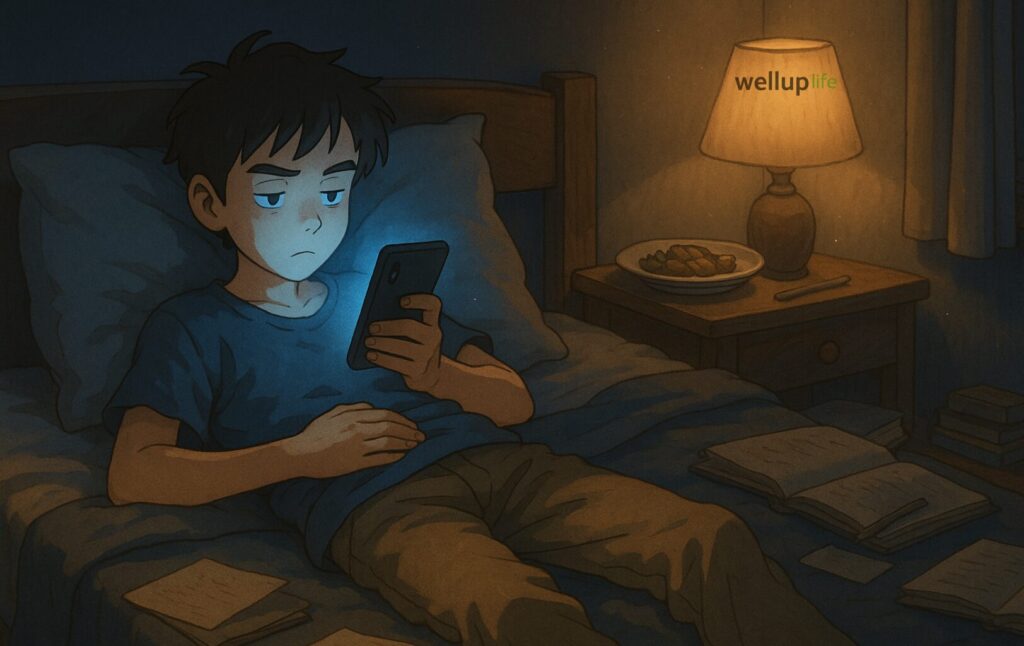Physical Address
304 North Cardinal St.
Dorchester Center, MA 02124
We independently evaluate and recommend products we believe will benefit our readers. If you purchase through links on this page, we may earn a commission.
Written By:

Published On: August 12, 2025
Last Updated On: September 6, 2025
Fact Checked By:

Reviewed By:


We live in a world where screens dominate our attention, from the moment we wake up to the moment we go to bed. On average, people spend over 7 hours a day staring at screens [1]Average daily screen time statistics. While technology keeps us connected, entertained, and informed, it’s also silently draining our energy, straining our eyes, and affecting our mental well-being.
If you’ve ever felt mentally foggy after hours of scrolling or noticed that “just five minutes” on your phone turns into an hour, you’re not alone. Your just five minutes of scrolling, how and when converted into hours, you don’t even realize. Too much screen time can impact your sleep, productivity, and even your relationships [2]Effects of excessive screen time. The good news? You don’t have to give up technology entirely — you just need a healthy balance.
That’s where offline activities come in. These are hobbies, experiences, and small moments of joy that don’t require Wi-Fi, notifications, or blue light. They reconnect you with the real world, boost your mood, and give your mind the refresh it desperately needs.
In this article, we’ll explore 10 offline activities to replace your screen time — simple, enjoyable, and fulfilling alternatives you can start today. Whether you want to improve your mental health, spend more quality time with loved ones, or just rediscover the joy of the present moment, there’s something here for you.
Screens are everywhere — in our pockets, on our desks, and even wrapped around our wrists. They make life convenient, but too much screen time slowly chips away at both our physical health and mental well-being.
Right now, most of our waking hours are swallowed up by digital devices. We’re scrolling, swiping, and staring at glowing rectangles, leaving little space to truly connect with ourselves or the world around us. When was the last time you went for a walk in the park, hit the gym, played cricket or football with friends, or simply sat in quiet reflection?
In this digital era, making room for offline activities isn’t just a nice lifestyle choice — it’s essential for a healthier, more balanced life. Here are some science-backed reasons why you need to replace your screen time with some offline activities.
Spending too much time online can lead to information overload, anxiety, and even feelings of isolation [3]Mental health effects of screen time. Social media comparisons, constant notifications, and endless news cycles can make your brain feel like it’s running a marathon without a finish line. Offline activities offer a much-needed pause, letting your mind breathe and reset.
Blue light from screens disrupts your body’s natural sleep cycle, making it harder to fall asleep and stay asleep [4]Blue light and sleep disruption. Replacing your late-night scrolling with calming, offline activities — like reading a book or journaling — can improve rest and help you wake up more refreshed.
Constant app-switching and multitasking train your brain to crave short bursts of stimulation, making deep focus difficult. Offline activities help rebuild your attention span, allowing you to work or study with more efficiency and less mental fatigue.
When you’re glued to a device, you might physically be with people, but mentally elsewhere. Choosing in-person hobbies like board games, cooking together, a little dance with your loved ones, or going for a walk fosters genuine connection and shared memories — something a “like” or emoji can’t replace.
Too much sitting, combined with poor posture from phone or laptop use, can lead to back pain, eye strain, and even long-term health risks [5]Sedentary lifestyle risks. Swapping some of that screen time for movement-based activities like hiking or yoga benefits both your body and your mind.
Now that we’ve talked about why cutting down screen time matters, it’s time to look at what you can do instead. Below, we’ll explore 10 enjoyable and meaningful offline activities that don’t just fill the time — they enrich it. These ideas are easy to start, require little to no tech, and can fit into almost any lifestyle. Whether you’re at home, outdoors, or with friends, you’ll find something here to inspire you to put the phone down and live more in the moment.
There’s something magical about holding a real book — the weight in your hands, the sound of turning pages, the smell of paper. Unlike scrolling on a phone or reading a PDF, reading a physical book pulls you into a world without pop-up ads or notification pings.

Reading offline improves focus, reduces stress, and stimulates your imagination [6]Benefits of reading books. Research shows that even just 30 minutes of reading can lower your heart rate and ease tension.
Pro tip: Join a local library or book club to make reading a social experience. This way, you’ll have fresh books to explore and people to share your thoughts with.
Few things can refresh your mind and body as much as stepping outside and moving through nature. Whether it’s a quiet morning walk around your neighborhood or a challenging hike on a nearby trail, outdoor walking helps you disconnect from screens and reconnect with the world around you.

Spending time outdoors has been shown to reduce stress, improve mood, and boost creativity [7]Benefits of spending time in nature. Walking also gets your body moving, improving cardiovascular health and reducing the risks linked to a sedentary lifestyle [8]Walking and health benefits.
Pro tip: Leave your phone in your pocket (or at home) during your walk — not just for digital detox, but to truly notice the small details: the rustling leaves, the fresh air, the sounds of birds.
Gardening is not just about planting seeds; it is more than that— it’s about nurturing life, love, and feeling the plants, slowing down, and reconnecting with nature. Whether you have a big backyard, a small balcony, or even just a sunny windowsill, gardening can be a calming and deeply satisfying offline activity.

Gardening has been shown to reduce stress, improve mood, and even lower symptoms of anxiety and depression [9]Mental health benefits of gardening. The act of tending to plants also encourages mindfulness — you focus on the present moment, the feel of the soil, the smell of flowers, and the joy of seeing growth over time.
Pro tip: Keep a small “garden journal” to track plant growth and note what works best. Over time, you’ll see your skills — and your plants flourish, and this will give a sense of satisfaction, and inner peace.
Journaling and creative writing are like having a conversation with yourself — one where you can be completely honest, explore your thoughts, and express your creativity without judgment. All you need is a pen, some paper, and a bit of quiet time.
Writing by hand has been shown to improve memory, enhance focus, and reduce stress [10]Benefits of journaling. Journaling helps you process emotions, set goals, and reflect on your day. Creative writing — whether it’s poetry, short stories, or personal essays — boosts imagination and sharpens your ability to communicate clearly.
Pro tip: If you want to combine self-reflection with creativity, try writing short fictional stories based on real-life events. It’s both therapeutic and fun.
Cooking or baking isn’t just about making food — it’s a creative, sensory experience that can calm your mind, boost your mood, and bring people together. From chopping fresh vegetables to smelling bread rise in the oven, the process is as rewarding as the result.

Spending time in the kitchen can reduce stress, increase mindfulness, and even improve confidence as you learn new skills [11]Psychological benefits of cooking. Cooking also engages multiple senses — touch, smell, taste, and sight — making it a fully immersive offline activity that keeps you in the moment.
Pro tip: Keep a “recipe journal” where you note what worked well, what you’d tweak next time, and any special flavor combinations you discover. Over time, you’ll build your own personalized cookbook.
Board games and card games are timeless offline activities that bring people together for fun, laughter, and a little friendly competition. Whether it’s a weekend family night or a casual gathering with friends, these games create moments you’ll actually remember — unlike another evening spent scrolling through your phone.

Playing games in person strengthens social bonds, improves problem-solving skills, and keeps your brain sharp [12]Cognitive and social benefits of playing board games. Unlike online games, there’s no lag time, no pop-up ads, and no distractions — just real interactions and shared enjoyment.
Pro tip: Keep a small game collection at home so you’re always ready to entertain guests without relying on screens.
DIY crafts and art projects are a wonderful way to channel your creativity into something tangible. From painting and knitting to woodworking or pottery, these activities give you the joy of creating with your own hands — something that screen-based hobbies can’t truly replicate.
Engaging in creative hobbies has been shown to lower stress levels, improve problem-solving skills, and increase feelings of well-being [13]Health benefits of creative activities. Crafting also encourages mindfulness because it requires focus, patience, and attention to detail, helping you stay present in the moment.

Pro tip: Keep your projects small and manageable in the beginning so you don’t feel overwhelmed. Over time, you can work your way up to more complex creations.
Volunteering is one of the most fulfilling offline activities you can do — it not only benefits others but also enriches your own life. Whether you’re helping at a local food bank, cleaning up a park, or mentoring students, giving your time creates a deep sense of purpose and connection.

Volunteering has been linked to improved mental health, reduced feelings of loneliness, and increased life satisfaction [14]Health benefits of volunteering. It shifts your focus from the digital world to real-life impact, helping you see tangible results from your actions.
Pro tip: Bring a friend or family member along. Not only will you double the help, but you’ll also make the experience more social and memorable.
Meditation and yoga are powerful offline practices that help you slow down, quiet your mind, and reconnect with your body. In a world where notifications constantly pull your attention in different directions, these practices offer a rare chance to pause and simply be present.

Meditation reduces stress, improves focus, and increases emotional resilience [15]Mental health benefits of meditation. Yoga combines mindfulness with physical movement, enhancing flexibility, strength, and overall well-being [16]Health benefits of yoga. Both practices help counteract the mental overstimulation and physical strain caused by excessive screen time.
Pro tip: If you’re a beginner, join a local class to learn proper yogasanas and meditation techniques. Once you’re comfortable, you can practice on your own at home or even outdoors.
Picking up a musical instrument is one of the most rewarding offline activities you can try. Whether it’s strumming a guitar, learning piano, or even experimenting with hand drums, music engages both your mind and body in a deeply creative way.

Learning and playing an instrument improves memory, enhances coordination, and boosts mood by triggering the release of dopamine — the brain’s “feel-good” chemical [17]Cognitive and emotional benefits of playing music. It’s also a great way to express emotions without words and create something uniquely your own.
Pro tip: Record your progress over time. Listening to how much you’ve improved can be incredibly motivating and satisfying.
Knowing what to do is the first step — but making the shift from constant screen use to engaging in offline activities takes intention and a little planning. Here’s how you can transition smoothly without feeling deprived or disconnected.
Going from hours of scrolling to a full digital detox overnight can feel overwhelming. Instead, reduce your usage bit by bit. For example, replace 30 minutes of social media time with an offline activity like reading or walking. Slowly increase your offline time each week until it becomes a natural habit.
If you don’t plan them, screens will fill your free time by default. Add your chosen offline hobbies to your daily or weekly calendar. Treat them like important appointments — because they are.
Designate certain spaces in your home (like the dining table or bedroom) as no-device zones. This makes it easier to avoid mindless scrolling and encourages in-person connection.
Ironically, a few apps can help you manage screen time — set usage limits, block distracting apps, or schedule downtime. Once you’ve freed up the time, commit to filling it with one of the activities from this list.
The goal isn’t to simply avoid screens — it’s to replace that time with something more enriching. If you remove screen time without a fulfilling alternative, you’ll likely slip back into old habits. Make sure every freed-up hour is replaced with an activity you genuinely enjoy.
Invite friends or family to join you in your offline activities. This adds social motivation and makes it less tempting to retreat into your phone.
Stepping away from screens isn’t about rejecting technology — it’s about reclaiming your time, focus, and presence. By intentionally choosing offline activities, you create space for creativity, connection, and personal growth that endless scrolling can never provide.
Start small, stay consistent, and treat each screen-free moment as an investment in your well-being. Whether you’re painting, playing music, or simply taking a mindful walk, every offline choice strengthens your ability to live fully in the present.
So, put your phone down, look up, and step into a life that happens beyond the screen — because that’s where the most meaningful moments are waiting for you.
Read Next: How To Get Rid Of Cell Phone Addiction in Just 7 Days
Vedant & Stoic Thinker
Suchit Prajapati, MA in Philosophy, is the Editorial Director at Wellup Life. A passionate Vedant and Stoic thinker, he inspires readers to embrace happiness, inner peace, and purposeful living through timeless wisdom.

Reviewed By:


Reviewed By:


Reviewed By:


Reviewed By:


Reviewed By:


Medically Reviewed By:


Medically Reviewed By:


Medically Reviewed By:

Wellup Life is your space for personal growth, wellness, and mindful living. From self-improvement and productivity to spirituality and relationships, we share practical insights and timeless wisdom to help you live with clarity, balance, and purpose.
Copyright © 2024 – Wellup Life — All rights reserved
